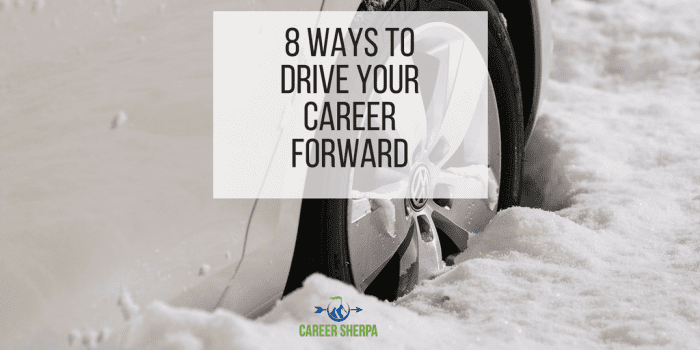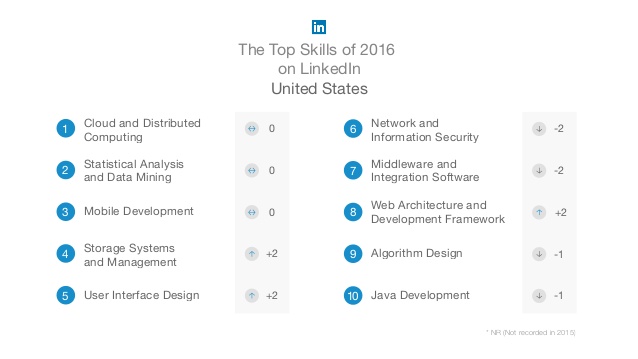In order to drive your career forward, you’ll need to overcome some of the hazards many workers face.
What rut is your career stuck in? Do you feel stuck in a job you despise or have you become complacent or unaware of current trends impacting your company or job?
In order to drive your career forward, you need to set your GPS navigation device to the direction based on goals that are important to you.
Here are eight things that will help you take control of your future and drive your career.
Reassess Values and Priorities
Reassess what’s important to you now and create a list. Aligning your priorities and values helps you find work that is meaningful. If a flexible work schedule is most important to you at this point in your career, then don’t compromise.
Ask your boss what options are available for you- flexible, virtual or remote work might be an option. If not, you may have to look for a new job that offers a more flexible schedule. But a small warning. Not all job postings clearly identify a flexible, remote or virtual work arrangement. Even if they don’t say they are open to remote candidates, apply anyway if the job looks good. You might be able to negotiate after you’ve been extended a job offer.
When you know what is most important to you, it helps prevent you from worrying about the trivial things at work you can’t control.
Check out this post about how to use a decision-making matrix
Update Skills and Knowledge
LinkedIn released its Top Skills list, which includes skills employers are likely to need most based on the analysis of LinkedIn job postings and user profiles. Almost every skill involves technology.
This is a good time for you to do some research and see if you have gaps in your technology knowledge based on job postings.
Moving forward, find time to read current industry news and set job alerts so you can keep up with what employers are looking for.
If you need to fill a skills gap, look for online training or ask people with those skills how they acquired them.
And make sure you update your list of skills on LinkedIn.
Try Something New
Whatever routine you find comfortable, switch it up and do it differently. Take a new route home, try out a new app or use the phone instead of email.
Doing something new may seem difficult, but the initial struggle will keep you on your toes and help you stay agile and resilient.
Keep Your Network Alive
Networking is the best way to find out about a new job before it actually gets announced and posted. And more jobs are filled through referrals than any other method, even job postings. One of the best things you can do to drive your career forward is to invest time networking.
In order for you to secure your next role, either internally or externally, you will need an ally to help your application rise to the top.
If you are planning an internal move, be sure you are visible at company events and among the managers of the group you want to join. Externally, network strategically with people who work inside companies you want to work for and attend industry networking events for greater visibility.
Build networking time into your schedule. Your network is too important to ignore and you’ll need it when it is time to make a move.
Know When to Say “No”
If you are like many people, you probably have a tendency to over-commit. Start saying no and see what happens. Maybe other people will step forward. Maybe your manager will find someone else to do the work.
Saying no can be liberating and empowering, and it isn’t as hard as you may think.
By turning down assignments, you may actually feel less stressed and enjoy your work life more! And with your newfound time, you can work on projects that really interest you and ones that will drive your career.
Unplug
When was the last time you took a vacation? If it’s been awhile, you may need a mental holiday. Unplugging from work while you’re out of the office will make it more relaxing. This requires planning well in advance.
Start by talking with your manager and set the expectation that you will not be available to check email or respond to calls during your vacation. In most cases, this is possible as long as you have someone you can delegate your work to.
Next, make sure everyone knows who will be handling your work while you are out of the office.
Finally, in case of a true emergency, make sure you provide contact information to your manager.
You can read more tips on how to plan for your vacation here.
Get Physical
Why wait until January to start your new exercise regime? Begin today. Walking, running or even yoga gets the blood moving and can make you feel better almost immediately.
Whether you make changes to the food you eat or the amount of exercise you get, starting sooner rather than later will make you feel better.
Stick With It
In order for new behaviors to stick and become habit, you’ll need to keep working at them for 30 days. That’s how long it’s supposed to take for a new venture to become routine.
This post originally appeared on US News & World Report

Hannah Morgan speaks and writes about job search and career strategies. She founded CareerSherpa.net to educate professionals on how to maneuver through today’s job search process. Hannah was nominated as a LinkedIn Top Voice in Job Search and Careers and is a regular contributor to US News & World Report. She has been quoted by media outlets, including Forbes, USA Today, Money Magazine, Huffington Post, as well as many other publications. She is also author of The Infographic Resume and co-author of Social Networking for Business Success.


